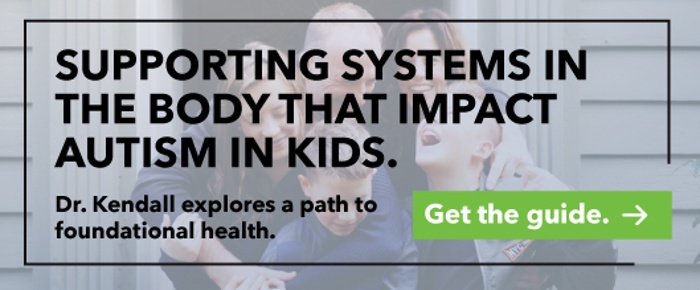
By Dr. Roger Kendall
There are so many factors that contribute to behavioral challenges, trying to mitigate the symptoms becomes uniquely difficult.
Behavioral challenges can include impaired communication and social skills because behavioral and neurological functions and the way an individual receives and absorbs messages can be altered.
No Universal Approach to Care
Because the causes of behavioral challenges are so broad and complex, no universal approach to care is going to fit the needs of each child affected. Many different elements enter into the bigger picture, so recognizing and diagnosing what makes each particular case unique is critical to remediating the associated conditions.
As a practitioner, and even as a parent, you have to approach the symptoms with a wide brush until you can develop a refined program that works for that individual child.


DMG and bEHAVIORAL cHALLENGES
Dimethylglycine (DMG) is an amino acid that is an essential part of the metabolic pathway. It’s so important because it’s a one-carbon-donator that directly affects the methylation pathways, the immune system, and detoxification pathways.*
Methylation
The importance of methylation can’t be understated; we could write a separate post focusing on it alone. Methylation plays a role in many conditions, and it impacts a wide range of factors that help to establish what functional medical practitioners consider good health and well-being. In short, DMG supports methylation.*
Immunological Imbalances
Many children with behavioral challenges suffer from immunological imbalances. Their bodies often have trouble dealing with invaders that other children may handle more easily. Behaviorally challenged kids seem to have an impaired ability to develop a robust immune system.
A number of published studies have shown DMG to enhance and improve the immune system.* The beauty of it is that it has been shown to enhance antibody production (B Cells) as well as T Cells, which produce specific protein molecules that help keep the immune system strong and defend the body from outside invaders.*
Detoxification and Healthy Inflammation Benefits
One of the most well-known factors that lead to behavioral challenges is exposure to environmental toxins. Heavy metals, pesticides, and chlorinated hydrocarbons are linked to major cognitive and neurological issues along with inflammation and a weakened immune system.*
Dimethylglycine supports a healthy inflammatory pathway that helps isolate free radicals.* On top of that, DMG is one of the principal building blocks for the production of glutathione.* The liver produces glutathione as one of the body’s primary detoxifying agents and antioxidants.* DMG also helps increase oxygenation and reduces levels of lactic acid.* These are all factors that contribute to a variety of challenges.
Dimethylglycine is a biomedical intervention, but sometimes the body just isn’t producing enough of it. Under these circumstances, providing DMG as a supplement can help the patient reap the benefits and biomedical enhancements that adequate levels of this particular amino acid impart.*
Studies have shown DMG contributes to many health improvements and is extremely effective at improving methylation, the immune system, and detoxification.*
DMG and the GI Tract
Gut issues and GI tract impairment are affected by diet and other external factors. Heavy metals are also factors, and they’re a constant issue for the body, found in a number of sources.
Because gut dysfunction is often a result of a partially blocked methylation process, DMG can help to balance GI tract issues.* Additionally, the detoxification and glutathione support it provides can help the body reduce its levels of heavy metals and environmental chemicals.*
With that said, DMG doesn’t work alone. It is a precursor to SAM-e, and there are some enzymes, vitamins, and cofactors such as vitamin B12 and folic acid which help transfer the methyl groups to SAM-e.* So, if the patient is deficient in any of these lateral areas, supplementing with DMG could cause Dimethylglycine to build up and result in other imbalances.
Factoring It All Together
DMG can help behavioral challenges by supporting:
- Vocal communication*
- Social skills*
- Eye contact*
- Improved quality sleep*
- Focus and calm*
And it doesn’t take a long time for patients to see positive results. DMG often begins working in days, not weeks. DMG has been shown to be particularly helpful with symptoms such as repetitive behavior and impaired communication skills.* In fact, studies done by Dr. Rimland showed that 45% of 6000 parents who gave their children DMG supplements reported significant improvements.*
When we consider how complex behavioral challenges are, and how many different things can contribute to its array of symptoms, significant improvements in nearly half of all patients is an astounding number. There are a number of DMG supplements available on the market, but some are better than others. The best DMG supplements for targeting behavior combine many of the essential cofactors and are created based upon research on the optimization of methylation pathways.*
DMG supplementation isn’t going to work for every patient. But it is something that practitioners can test with a trial period. If it doesn’t work, they can still utilize this information to create a plan that works for that specific child—the problem causing the symptoms may not be related to the methylation pathways. However, if the problem does have to do with methylation, DMG and adjacent supplementation may provide significant benefits to the patient.*
*These statements have not been evaluated by the Food and Drug Administration. This product is not intended to diagnose, treat, cure or prevent any disease.




















